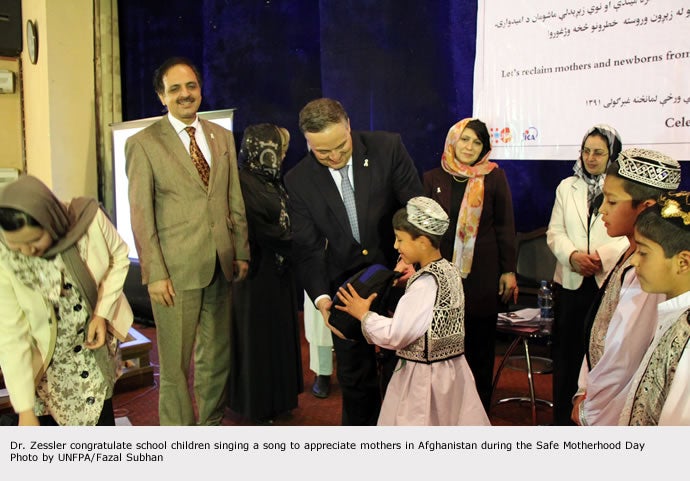UNFPA joined the Ministry of Public Health to celebrate the Safe Motherhood Day 2012.

In a country like Afghanistan where resources are scarce, access to services is limited and women still very much discriminated, promoting safe motherhood remains a challenge.
"We know that the heavy burden of atrocities, illnesses and disabilities has disturbed mothers in Afghanistan, more than anywhere else in the world" said Her Excellency Dr. Suraya Dalil, Afghan Minister of Public Health during the ceremony to celebrate the Safe Motherhood Day in Kabul, Afghanistan.
Despite the challenges fewer women are now dying during pregnancy and childbirth also in Afghanistan. As reported by the Afghanistan Mortality Study 2010, the maternal mortality ratio in the country is 327 deaths to women per 100,000 live births, much lower than previously believed. Today the percentage of births delivered by skilled birth attendants has doubled from 14% in 2003 to 34% in 2010. These remarkable improvements were possible thanks to the collective programme implementation in areas such as training of midwives and community health workers to ensure women have access to health care in rural areas, rehabilitation of the health sector resulting in enhanced access to health facility and support of the return of millions of girls to school, resulting in women getting married later, thereby decreasing the frequency of high-risk pregnancies and increasing family planning.
Yet while early signs of a decline in maternal deaths are promising, the progress is not of the scope and magnitude needed to achieve MDG 5 and its two targets: reducing maternal mortality by three-quarters from 1990 levels, and ensuring universal access to reproductive health by 2015. In Afghanistan today pregnancy and childbirth accounts for 40% of deaths among women between the ages of 15-49.
"Most of the maternal deaths are preventable, and we know that 80% of these deaths can be avoided by attendance of skilled health providers during child birth" said UNFPA CO Representative Dr. Laurent Zessler.
As part of a comprehensive approach to human resources for health system strengthening, UNFPA is working to strengthen national capacity to increase skilled attendance at all births by scaling up the capacity of midwives. UNFPA is also providing support to the Obstetric Fistula Center in Malalai Maternity Hospital and it is testing the model of the Family Health House from the point of increasing access to reproductive health services for communities in remote settlements in a sustainable and affordable manner. UNFPA is training community midwives and by 2014 will have established 174 Family Health Houses in 4 Bamiyan, Daikundi, Faryab in remote areas of these districts that will help save countless mothers lives.

